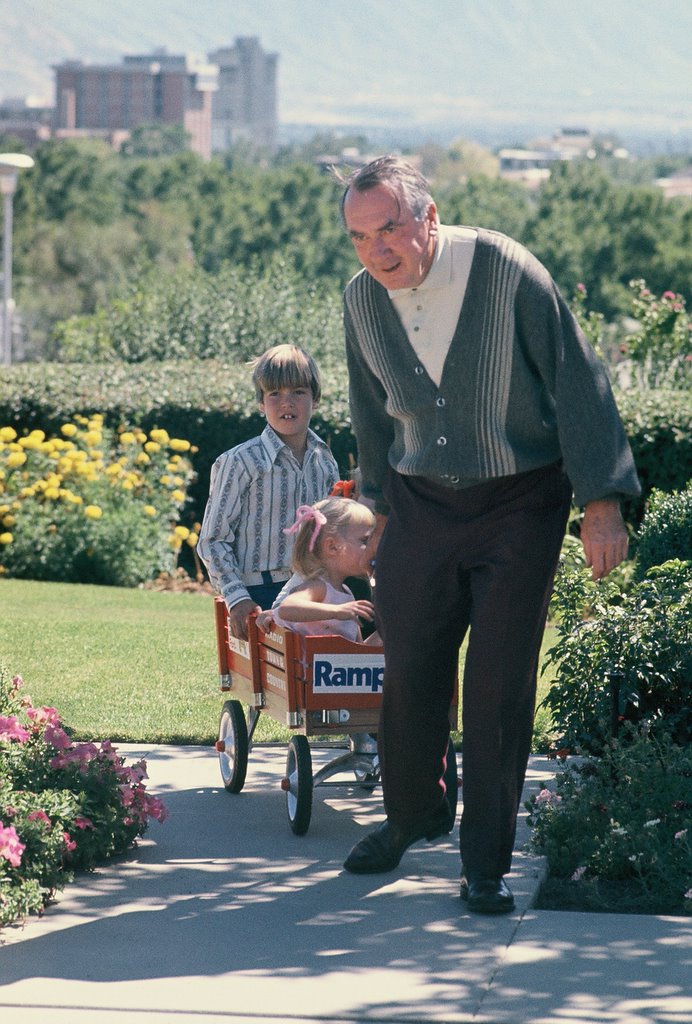

Many paid respects at Governor's Mansion Thursday
By Robert Gehrke
The Salt Lake Tribune
Article Last Updated:09/21/2007 07:31:36 AM MDT
Scores of Utahns filed through the Governor's Mansion on Thursday to pay tribute to the late Cal Rampton, the state's longest serving governor.
"I think he wouldn't have expected it," said Rampton's daughter, Janet Warburton. "He was a pretty humble guy when it gets down to it, and he said, 'Nobody would come.' "
But scores of people did come, from old friends to passing acquaintances, to three classes of seventh-graders, all born nearly two decades after Rampton left office.
Rampton's flag-draped casket sat just inside the main south doors of the historic mansion, with an American flag and Utah National Guard soldier at one end, a Utah flag and state trooper at the other.
Rampton never lived in the current Governor's Mansion, which was turned over to the state Historical Society by his predecessor, J. Bracken Lee, but restored as the first family's residence by his successor, Scott Matheson.
Rob Miller, now vice-chairman of the Utah Democratic Party, spent much of his youth in the Utah Capitol while his father was Rampton's press secretary and later a senior aide, and said Rampton is the reason he's a Democrat today.
Miller said one afternoon he and his sister were fighting over a record player in the office next to his dad's when Rampton made peace between the feuding siblings and listened to records while he held the children on his lap.
"He was a true gentleman," said Gloria Hunt, who worked in the highway department during the Rampton administration and still works in the Governor's Office. "He had a real vision of what state government should be."
Many who came praised his willingness to work across party lines and find solutions that would benefit the state, particularly his efforts to improve Utah's education system and bolster tourism and economic development.
"He had a knack for bringing people together, all people, not just one group of people," said Joe Torres, a state employee. "That's why I stopped by today, because he had a knack for that and I think that's somewhat lacking today."
Brent Cameron was part of a body created by Rampton to foster industrial development, called "Rampton's Raiders," and later was his campaign coordinator in Salt Lake County when Rampton ran for a third term.
"Cal has always been a true inspiration and mentor to me and a true friend," Cameron said.
George Durham knew Rampton through his father, G. Homer Durham, whom Rampton appointed as the first commissioner of education and spoke highly of the governor.
"As I visited here a lot, I heard what a competent and capable man he was," Durham said.
Rick Olsen, a teacher at Bryant Middle School, brought three of his classes to the mansion because he believed it was a chance for them to see history.
"I want the kids to find out the importance, not only of our government, but what are the protocols of coming to a state ceremony," he said.
Richard Christenson was a teenager when he met Rampton, then an attorney in private practice, and said the future governor always treated him as a contemporary.
Years later, Christenson became Rampton's LDS Church bishop and home-teacher.
"Cal treated all human beings as if they were children of God," he said. "He didn't wear his religion openly. He just lived it."
As he aged, Rampton remained a lion in the Utah Democratic Party, frequently speaking at party gatherings and advising party leaders.
Party Chairman Wayne Holland said, "The Guv" serves as a model when he tries to recruit young candidates to run for office, both for his leadership ability and his perseverance, since Rampton ran and lost a half-dozen times.
Holland said he, Rampton and some other Democrats were meeting recently at The Alta Club, when one Democrat started griping about what they felt were dirty political attacks from Republicans, and asked when Democrats were going to respond in kind.
Rampton slammed his fist on the table and bellowed in his gruff voice: " 'Integrity! Integrity is what we're about,' " Holland said. " 'We may win or we may lose, but we'll never lose our integrity.' "
Rampton died Sunday at the age of 93. He had been diagnosed with cancer and suffered a stroke after entering hospice care. Despite his ailments, those who visited him in hospice said his renowned mind remained sharp.
Warburton said that, as the stream of friends visited him, "it was starting to dawn on him that he was loved."
Rampton's funeral will be at 11 a.m. today at the Salt Lake Parleys LDS Stake Center, 1870 E. Parleys Canyon Blvd.






